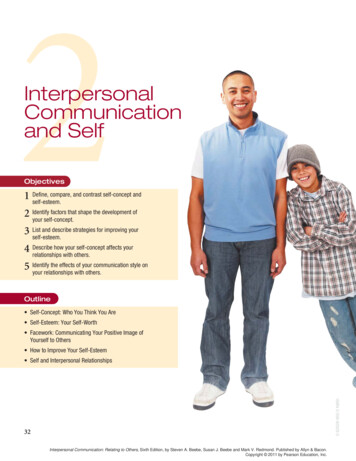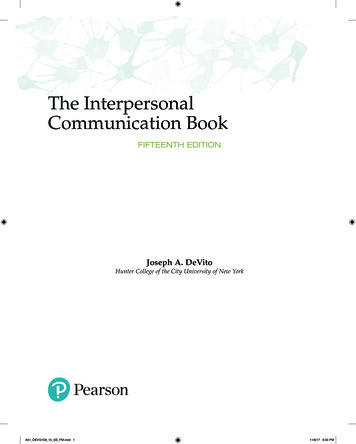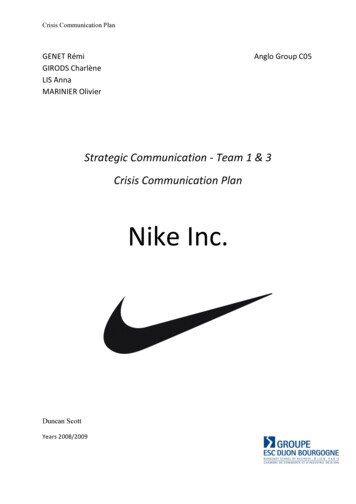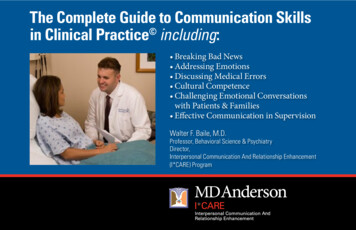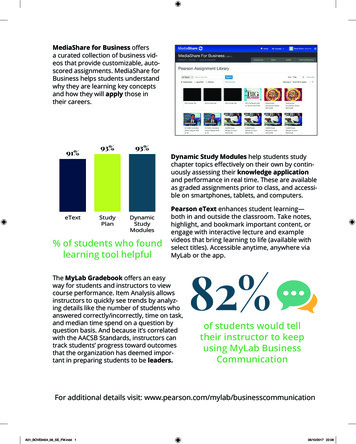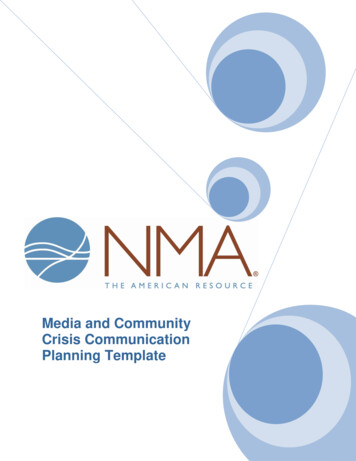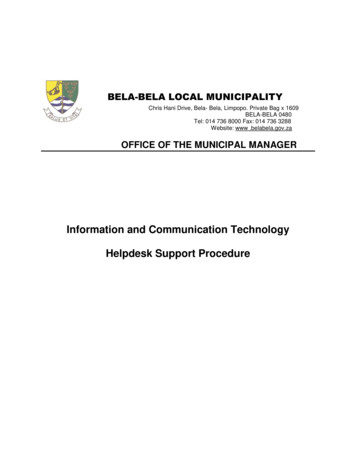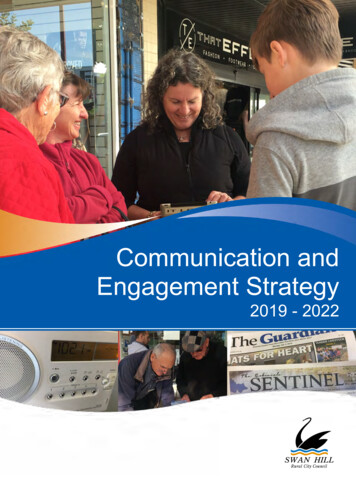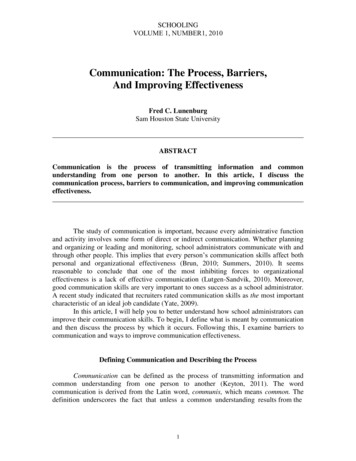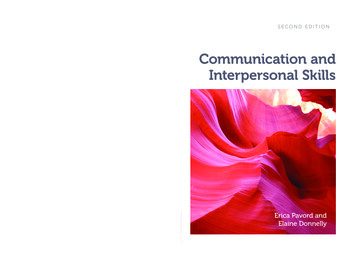
Transcription
SECOND EDITIONThe second edition of this popular book will enable nursing and health carestudents to improve their communication and interpersonal skills. It providesan introduction to the theory that underpins communication studies and offersopportunities for students to reflect on their own practice. The book gives studentshelpful guidelines and tips, while emphasising that successful communicationdepends on the quality of the relationship.The new edition covers: Key concepts in communication; Self-awareness and understanding our impact on others; Transactional Analysis; Listening skills; Communication skills in practice; An extended case study that brings together the concepts and principlesdiscussed throughout the book.Communication and Interpersonal Skills uses activities, scenarios and case studies tosupport learning and to enable students to apply theory in their practice. It is idealfor students on nursing and health and social care courses who want to use theircommunication skills to improve the quality of care they offer to their patients andservice users.The authorsBefore her retirement, Elaine Donnelly was Senior Lecturer in Health, Social Careand Psychology at the University of Worcester; she was also a registered mentalhealth nurse.Erica Pavord is a counsellor for children, young people and families and a SessionalLecturer at both Worcester University and the University of South 086250219781908625007Communication andInterpersonal SkillsPavord & DonnellyRelated Titles:Communication and Interpersonal SkillsCommunication andInterpersonal SkillsErica Pavord andElaine DonnellyISBN 978-1-908625-32-8www.lanternpublishing.comComm Skills COVER.indd 19 781908 625328 Brad Pict - Fotolia.com02/04/2015 12:17
Communication andInterpersonal Skills
HEALTH AND SOCIAL CARE TITLESAVAILABLE FROM LANTERN PUBLISHING 2010978190862500797819060520589781908625229TitleA Handbook for Student NursesCaring for People with Learning DisabilitiesClinical Skills for Student NursesºEffective Management in Long-term Care OrganisationsEssential Study Skills for Health and Social CareFirst Health and Social CareFundamentals of Diagnostic ImagingFundamentals of Nursing CareImproving Students' Motivation to StudyInterpersonal Skills for the People ProfessionsLeadership in Health and Social CareNeonatal CarePalliative CareProfessional Practice in Public HealthSafe & Clean CareThe Care and Wellbeing of Older PeopleThe Care ProcessUnderstanding and Helping People in CrisisUnderstanding Research and Evidence-Based PracticeUnderstanding WellbeingValues for Care PracticeWellbeing: Policy and PracticeThis revised and updated edition adopts a reflective approach using exercises thatare related to the development of the skills required to make the transition fromundergraduate to postgraduate thinking and writing. Questions and activitiesencourage readers to identify the skills that the postgraduate student shouldpossess and to demonstrate an understanding of how those skills are developed.The book is easy to use and jargon-free with clearly defined learning goals.Reflection points are included in order to support independent learning andenquiry, and there are also suggestions for additional reading throughout the book.Study Skills for Master’s Level Students can therefore be used as an independentstudent study tool or by lecturers in workshop settings.From reviews of the first What a delight it is to read a book which takes complexscientific concepts and ensures they are understandable by all.”A Reflective Approach for Health and Social CareWith activities and answers, reflection points and a glossary, this interactive textbooksupports the ‘Fit for Practice in the Genetics Era’ competence framework, offering anintroduction to the theory of genetics and then using common genetic conditions/disorders as case studies to help students apply theory to practice and examine theservice user experience. Cell and DNA structureInheritancePedigree testingCancer genetics Down’s SyndromeSickle Cell AnaemiaHuntington’s DiseaseCystic Fibrosis Genetic counselling Muscular DystrophyFrom lecturer reviews:“A well written and nicely laid out genetics text at an appropriatelevel for adult nursing students.”“Fabulous text, student friendly.”9781908625021ISBN 978-1-908625-15-1Debbie Casey, Liz Clark and Sally Hayes97819086252439781908625014A Guide for Students and Practitionersof Nursing and Health Carestudents of nursing, health care and for a wide range of health care practitioners.ISBN csVipondRelated titles:From the Foreword by Candy Cooley:Genetics is written by an experienced teacher of health care sciences and is ideal forCasey, Clark & Hayes“There are no other books like this one available for students doing master’sdegrees so it is a great resource that can help you to develop your skills in this areaand understand the requirements of postgraduate study The book is also greatfor lecturers as the activities and workshops can easily be used in seminars andworkshops. Highly recommended.”Revised editionRevised editionStudy Skills forMaster’s LevelStudentsA Guide for Students and Practitionersof Nursing and Health CareRevised editionTopics covered include: Critical thinking Developing independent study skills Finding and using literature Applying postgraduate skills in the workplace Writing at Master’s level How to get published.GeneticsGeneticsA Reflective Approach for Health and Social CareStudy Skills for Master’s Level StudentsStudy Skillsfor Master’s Level Students9 781908 6251759781908625021www.lanternpublishing.co.uk9 781908 6251519781908625175Karen Vipond9781908625151
Communication andInterpersonal SkillsErica Pavordand Elaine Donnelly
ISBN 978 1 908625 32 8First edition published in 2008 by Reflect Press Ltd (ISBN 9781906052065)Second edition published in 2015 by Lantern Publishing LimitedLantern Publishing Limited, The Old Hayloft, Vantage Business Park, Bloxham Rd, Banbury,OX16 9UX, UKwww.lanternpublishing.com 2015, Erica Pavord and Elaine DonnellyThe right of Erica Pavord and Elaine Donnelly to be identified as the authors of this work hasbeen asserted by them in accordance with the Copyright, Designs and Patents Act 1988.www.cla.co.ukBritish Library Cataloguing in Publication DataA catalogue record for this book is available from the British LibraryThe authors and publisher have made every attempt to ensure the content of this book is upto date and accurate. However, healthcare knowledge and information is changing all thetime so the reader is advised to double-check any information in this text on drug usage,treatment procedures, the use of equipment, etc. to confirm that it complies with the latestsafety recommendations, standards of practice and legislation, as well as local Trust policies andprocedures. Students are advised to check with their tutor and/or mentor before carrying outany of the procedures in this textbook.Typeset by Medlar Publishing Solutions Pvt Ltd, IndiaCover design by Andrew Magee Design LtdPrinted in the UKDistributed by NBN International, 10 Thornbury Rd, Plymouth, PL6 7PP, UK
CONTENTSIntroductionviiAbout the authorsxi1 Introducing key concepts in communication12 Understanding ourselves and our impact on others193 Interpersonal communication374 Introducing Transactional Analysis615 Listening to people776 Communication and interpersonal skills in practice997 Case studyIndex117125v
INTRODUCTIONHELLO AND WELCOME TO THE SECOND EDITION OF THIS BOOKThis is the second edition of this book and it has been revised and updated since thefirst edition was published in 2008. Two chapters have been replaced by new ones, onehas changed significantly and the other chapters have been edited to accommodate thechanges. We hope that you continue to find it a useful companion to your studies.The book itself does not profess to be the definitive text – it is far too small to be that –but what it does do is present and explore some of the key issues and theories thatsurround effective communication. It explores what happens when communicationgoes wrong and outlines some possible solutions that you can put in place to limit theconsequences of poor communication and to develop more successful communicationsystems. Good communication is the key to effective care and we hope that you enjoydeveloping and practising the skills presented here.We envisaged that our readers would all be students new to the areas of study thatsurround health and social care and that they would be involved in working acrossa broad range of health and social care facilities and with a broad mix of people. Theauthors, who have an interest in the teaching of communication and interpersonalskills, have developed an introductory text that explores communication as a ‘skilledbehaviour’ for students working with people and is based on real teaching and learningactivities that have been tried and tested in the classroom.WHO IS THIS BOOK FOR?This book is primarily written to support students undertaking study in any fieldof health and social care. You may be studying single modules aimed at developingyour communication and interpersonal skills or you may be studying a full course forhealth and social care practitioners such as a Degree course in Nursing and Midwifery,a Foundation Degree in Health and Social Care, a course in Social Work, a coursedesigned for practitioners working in the Hospital and Emergency Care Services,vii
and so on. Regardless of which programme of study you are undertaking, this bookis written to provide you with a valuable introduction to the fascinating field ofInterpersonal and Communication Skills and it will help you to meet the learningoutcomes of your course.WHAT DOES THE BOOK COVER?Like many books in any subject it begins by offering definitions, and then explores themeaning of what it is to be a skilled communicator. We explore simple everyday issuessuch as courtesy and protocols and what can happen when we forget to apply these inpractice. It will introduce you to two theories of communication and give you examplesof how the theories relate to practice.Chapter 1 provides an overview of what is to come. Like most academic texts the bookbegins with an examination of definitions and then introduces you to some of theincredibly complex phenomena that surround communication and interpersonal skills.Chapter 2 deals with intrapersonal communication and self-awareness; in order for usto understand how to communicate more effectively with others, we need to knowourselves and know why we might respond in different ways to different people.This chapter will encourage you to reflect on who you are, what values and beliefsyou have and how these might impact on your communication with others. You willbe encouraged to become reflective practitioners, having the ability to reflect on yourpractice in order to improve your interpersonal skills.Chapter 3 takes you on to focus on some of the key issues involved in communicationwith others. It focuses on interpersonal communication. It looks at the kind ofcommunication that happens both verbally and non-verbally and it explores howdifferent environments can communicate to the people in them and how environmentscan impact on the way that practitioners and service users communicate. The chapterthen discusses the issues relating to intercultural communication and how age, gender,ethnicity and religion affect how we interact with others.Chapter 4 focuses on a psychological perspective of intrapersonal communication andinterpersonal skills. It introduces the work of Eric Berne and uses Transactional Analysisas a working theory to help you understand your own intrapersonal communicationprocesses and the communications that you have with others.Chapter 5 introduces the skills needed to ensure that we are listening in an active andempathic way to the people that we are caring for. Effective communication is largelydependent on our ability to really listen to people and show them that they haveviii
Introductionbeen heard and understood. It will describe the Rogerian, person-centred qualities ofempathy, acceptance and genuineness and show how to use active listening skills tocommunicate these qualities to those in our care.Chapter 6 encourages you to think about how we communicate with our colleagues andother professionals and touches on the other modes of communication that you willhave to use like record-keeping, email, text, mobile phone and social media.Chapter 7 gives you a detailed case study which will help you to reflect on the experienceof care. It shows the problems involved with dealing with difficult people and givesuseful advice on how to manage these situations.STUDYING WITH THIS BOOKThe writing team recognises that personal review, self-awareness and reflection can actas a powerful tool in the process of learning and you will be encouraged to reflect ona series of situations and then project the principles learned through these reflectionsonto your own working experience.You will then be invited to explore different aspects of interpersonal communicationand think about how you can develop your interpersonal skills to ensure that you areworking ethically and communicating effectively. Where possible we have provideddetails of relevant online resources, taking care to include those aspects that relate tothe nature of the work that you do and recommending only bona fide websites fordownloads.As you read through each chapter you will be invited to supplement your reading wi
Writing at Master’s level How to get published. The book is easy to use and jargon-free with clearly defined learning goals. Reflection points are included in order to support independent learning and enquiry, and there are also suggestions for additional reading throughout the book. Study Skills for Master’s Level Students can therefore be used as an independent student study tool .
